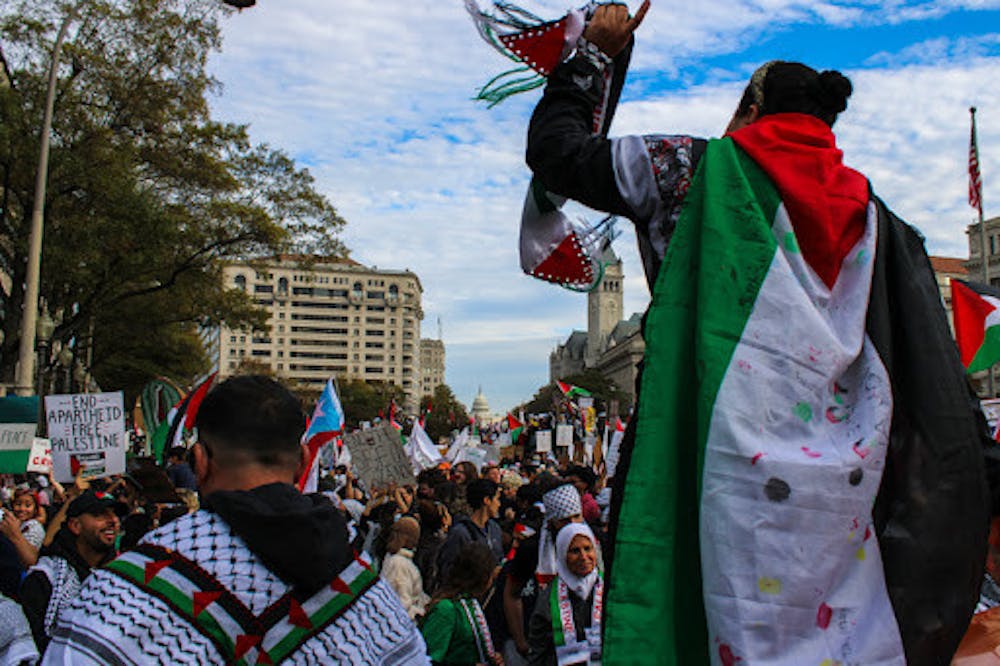Thousands of people gathered at Freedom Plaza in D.C. and marched to the White House on Nov. 4 to demand a ceasefire in the ongoing Israel-Hamas war and that the United States government stop sending military aid to Israel.
Pro-Palestine activists and supporters banded together in response to the Palestinian death toll approaching 10,000 in the war. As of Nov. 10, about one month since the initial attack from Hamas, the Palestinian death toll has surpassed 11,000, according to the Gaza Health Ministry.
The demonstration featured multiple guest speakers — coalition leaders, students, youth activists and Macklemore. Several organizations helped put together the event, such as The People’s Forum, Palestinian Youth Movement, American Muslim Alliance, ANSWER Coalition, National Students for Justice in Palestine and U.S. Campaign for Palestinian Rights.
Mohammed Nabulsi, an organizer with the Palestinian Youth Movement, spoke at the rally about why he and others showed up to the protest.
“We gather here as a show of strength, as a show of power, as a page in the historical record,” Nabulsi said to the crowd. “We gather here to declare to the U.S. government and to the world as a whole that the masses of this country and of this globe stand on the side of justice, of dignity, of liberation and on the side of the Palestinian people.”
After a few speakers presented and led chants, attendees passed a scroll of white paper over their heads as Palestine’s national anthem blared over the plaza. The scroll — nearly 100 feet long — contained the names of the nearly 10,000 Palestinian people killed in Gaza since the start of the war.
Adnan Qiblawi, who is Palestinian, drove five hours from New York to participate in the national march.
“It’s the greatest humanitarian crisis of our time … The world will know where we stood when a genocide was happening all over social media,” Qiblawi told The Eagle. “We have no excuse to say, ‘I don’t know what’s happening.’”
He said he felt excited to unite with so many others for a common cause, as well as a sense of release.
“For me, I just wanted to come and yell,” Qiblawi said. “There’s something like a deep hurt that we all want to collectively deal with.”
Qiblawi has extended family living in Palestine and said he feels emotional when he sees the news.
“It’s not one feeling,” he said. “You move through anger and grief and indignation and humiliation and loneliness because no one in America knows what it’s like to have your people live with a boot on their neck and be bombarded. For you, war is this distant faraway thing and, as humans, we can only empathize so much with something that’s just so far away. But for me, it’s my blood.”
Amira Tripp Folsom, a senior in the School of International Service and College of Arts and Sciences, said she chose to march because of her family’s history of oppression.
“My Korean grandmother, she spent the first seven years of her life living under Japanese occupation, and then she also lived through the Korean War,” Tripp Folsom said. “And then on the other side, my other three grandparents lived through and experienced first-hand American segregation, which is apartheid, which is exactly what’s happening in Israel right now.”
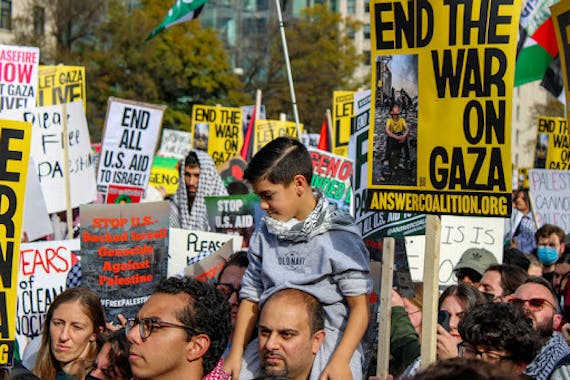
Nitin Khanna, a sophomore in the School of Public Affairs and the DEI director for American University’s chapter of Young Democratic Socialists of America, attended the protest with a group of fellow students and spoke on the diversity of the speakers.
“It wasn’t necessarily all Arab people or Muslim people or Palestinian people speaking,” he told The Eagle. “There was a Pan-African speaker … there were … two Indigenous women … comparing their strife with their land being taken with the Palestinian land being taken. There was a Filipino speaker who was talking about how their colonization against America was similar to the Israeli occupation in Palestine areas … It was very powerful.”
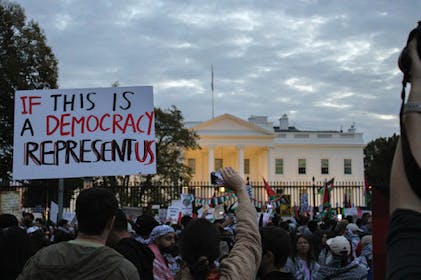
After about three hours of speeches, the crowd marched from Freedom Plaza to the White House. Outside the gates, protesters chanted “Guilty! Guilty!” and “Shame on you,” directing their anger at President Joe Biden. Some protesters expressed disappointment with Biden’s support for Israel, specifically his request for $14.3 billion in military aid for Israel.
Layan Fuleihan, the education director of The People’s Forum, told the crowd at Freedom Plaza, “The White House should be painted a million times red to account for the millions of crimes that it has carried out.”
Later in the day, protesters smeared handprints painted red on parts of the Northwest gate of the White House to represent the “millions of crimes” they accused Biden of supporting.
Dana Carmeli, who traveled to D.C. from central New York to attend the march, held a sign that read, “This Israeli citizen says stop funding Israel war crimes.”
“I’m an Israeli citizen; I am the granddaughter of Holocaust survivors. I’m horrified to see the images coming out of Gaza,” Carmeli said. “Innocent women, children, men, civilians are being murdered, in Gaza and our U.S. tax dollars are funding that genocide. You should be horrified and you should speak out when you see innocent people die, regardless of what country you come from or what nationality you … identify as.”
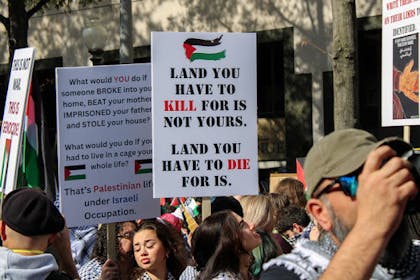
D.C. resident Shivaun Haynes and owner of the Instagram page @blackgirlvoices, an account she said is dedicated to amplifying the history of Black women and girls, said Americans need to take responsibility and empathize with the Palestinian people.
“As long as my tax dollars and the tax dollars of the American people continue to fund this so-called ‘war,’ we have blood on our hands,” Haynes said.
She added that solidarity is necessary to achieve justice, drawing parallels between the U.S. Civil Rights Movement and the current footage of Palestinian babies and children affected by the conflict. She specifically referenced Emmett Till’s mother, Mamie Till, who chose to display her son’s disfigured body in an open casket to showcase the brutality of lynching in 1955.
“Our liberation is intertwined. Black people have been oppressed for hundreds of years. We continuously fight for our own liberation. We keep us safe, we march in the streets,” Haynes said. “We empathize with Palestinian people and Palestinian mothers as we watch them show their babies to the world the same way in which people before us like Mamie Till to try to humanize our children and our people.”
During the speeches at Freedom Plaza, a member of National Students for Justice in Palestine identified as Ya’oub, talked about why “students are key to the cause” in the Palestinian Liberation movement.
“It’s because our campuses and institutions are microcosms of [the] U.S. empire,” he said to the crowd. “When students use our political education and institutional platform to resist the narrative of the empire, the cracks in supposed U.S. democracy begin to widen.”
American University students recently staged a walkout in support of Palestine where students called out President Sylvia Burwell and University administration and demanded they release a statement “condemning the genocide in Palestine.”
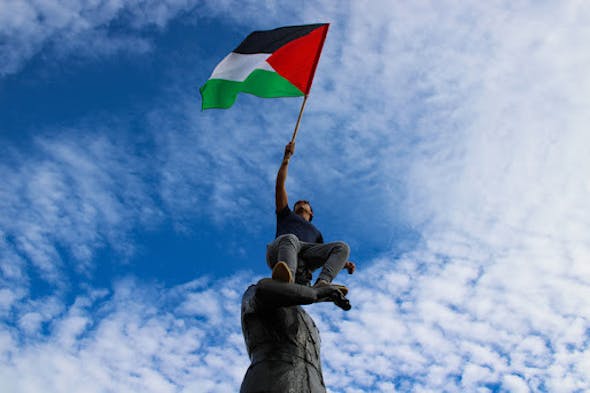
Qiblawi said the solution to the current conflict is a free Palestine — a land where people of all different religious backgrounds can coexist — like what the nation once was.
“Live with us, be free with us as we were before,” Qiblawi said. “My Christian grandmother used to babysit her Jewish neighbor’s kids on Shabbos. My Muslim grandmother, her best friend … was Jewish. That’s how it always was.”
Qiblawi said although he is not sure how the next few days or weeks will pan out, he is choosing to remain optimistic.
“[In] the most immediate future is a demand for a ceasefire,” Qiblawi said. “We need a ceasefire. There’s two parts: the part of me that is like, actually, we are in control of nothing and no one cares what we have to say and the part that believes that political change is possible. I’m on the record [going to] go down as being hopeful, even if there are doubts.”
This article was edited by Tyler Davis, Jordan Young and Abigail Pritchard. Copy editing done by Isabelle Kravis and Luna Jinks.

